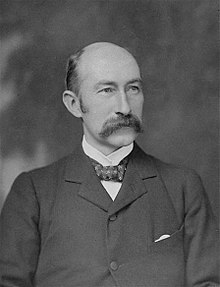H. B. Higgins
|
The Honourable Henry Bournes Higgins KC |
|
|---|---|
 |
|
| Justice of the High Court of Australia | |
|
In office 13 October 1906 – 13 January 1929 |
|
| Nominated by | Alfred Deakin |
| Preceded by | none |
| Succeeded by | Sir Owen Dixon |
| Member of the Australian Parliament for North Melbourne | |
|
In office 30 March 1901 – 12 December 1906 |
|
| Preceded by | Seat Created |
| Succeeded by | Seat Abolished |
| Personal details | |
| Born |
30 June 1851 Newtownards, Mayo, Ireland |
| Died | 13 January 1929 (aged 77) |
Henry Bournes Higgins KC (30 June 1851 – 13 January 1929), Australian politician and judge, always known in his lifetime as H. B. Higgins, was a highly influential figure in Australian politics and law.
He was born in Newtownards, County Down, Ireland, the son of The Rev. John Higgins, a Methodist minister, and Anne Bournes, daughter of Henry Bournes of Crossmolina. Ina Higgins, an early feminist, was his sister and Nettie Palmer, poet, essayist and literary critic, was a niece. The Rev. Higgins and his family emigrated to Australia in 1870.
H. B. Higgins was educated at Wesley College in central Dublin, Ireland, and at the University of Melbourne, where he graduated in law. He practised at the Melbourne bar from 1876, eventually becoming one of the city's leading barristers (a KC in 1903) and a wealthy man. He was active in liberal, radical, and Irish nationalist politics, as well as in many civic organisations. He was also a noted classical scholar.
In 1894, Higgins was elected to the Victorian Legislative Assembly as MLA for Geelong. He was a supporter of George Turner's liberal government, but frequently criticised it from a left-wing point of view. He supported advanced liberal positions, such as greater protection for workers, government investment in industry, and votes for women. In 1897, he was elected as one of Victoria's delegates to the convention which drew up the Australian Constitution. At the convention, he successfully argued that the constitution should contain a guarantee of religious freedom, and also a provision giving the federal government the power to make laws relating to the conciliation and arbitration of industrial disputes.
...
Wikipedia
